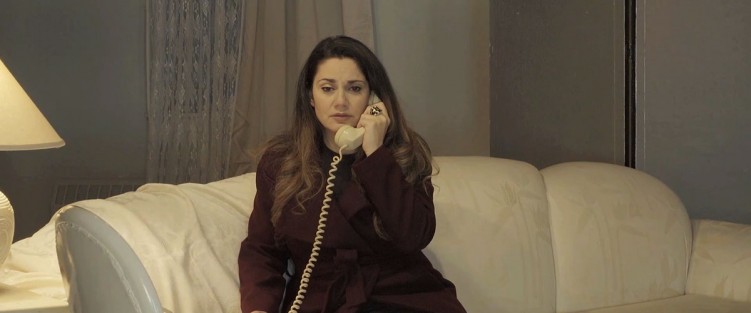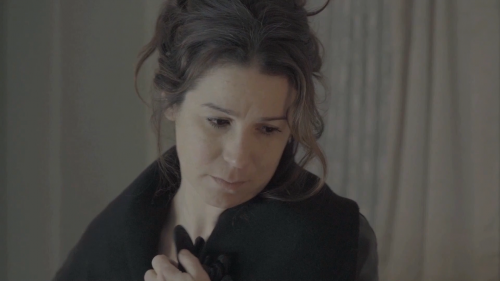 On February 5, Toronto’s Voicebox: Opera in Concert (OIC) made its digital debut with a fascinating double bill: The Human Voice and La Voix Humaine. This choice of material—an English-language version of Jean Cocteau’s 1928 play, paired with the 1958 Poulenc opera inspired by it—was in part, according to OIC general director Guillermo Silva Marin, in tribute to OIC founder, the late Stuart Hamilton, who first programmed these two pieces together in 1975. It also, however, makes for a perfect entry into digital pandemic programming. That both are solo pieces is ideal for working in a state of safety from infection—and also creates a great opportunity to showcase top talent and virtuosity, in this case the outstanding Chilina Kennedy and Miriam Khalil.
On February 5, Toronto’s Voicebox: Opera in Concert (OIC) made its digital debut with a fascinating double bill: The Human Voice and La Voix Humaine. This choice of material—an English-language version of Jean Cocteau’s 1928 play, paired with the 1958 Poulenc opera inspired by it—was in part, according to OIC general director Guillermo Silva Marin, in tribute to OIC founder, the late Stuart Hamilton, who first programmed these two pieces together in 1975. It also, however, makes for a perfect entry into digital pandemic programming. That both are solo pieces is ideal for working in a state of safety from infection—and also creates a great opportunity to showcase top talent and virtuosity, in this case the outstanding Chilina Kennedy and Miriam Khalil.
Cocteau’s play La Voix Humaine (1928) and Francis Poulenc’s 1958 opera of the same name, inspired by the play, tell the story of a nameless woman (“She” or “Elle”) in torment at the end of a love affair, longing and waiting for a phone call from her lost lover. That phone call, after several wrong numbers, makes up the whole of the play/opera. A woman alone in her apartment, her only connection with the outside world her phone, feels like an uncanny parallel to the lives so many of us are living now, prohibited from spending time with anyone outside our “bubbles.” When you have a bubble of one, the loneliness can be unbearable. This is the case with “She” in The Human Voice, alone on her end of the phone call and doing everything to win her lover back while knowing she has lost him forever.
According to biographies of Cocteau, the actors in his company had been complaining of coming second to directorial and design concepts in his productions. Taking up the challenge, Cocteau created this one-woman play that needs, even demands, a bare staging, so that the audience’s attention is clearly focused on the story and the virtuosity of the performer. In the OIC-streamed production, both play and opera take place in the same setting, a living space delineated by starkly white furniture arranged around the familiar confines of OIC’s Edward Jackman Studio. The setting is simple while also giving opportunity for movement and levels of action, and highlights the differences between the spoken and sung versions of the story as we watch both in the same space.
The opportunity to see the play and opera together like this is part of the fascination of this programming. The play is performed in English, in a translation by Daniel Raggett created for his 2018 production in London, England. The language is colloquial, modern, just right for today, so that every moment feels real. This is not to say that it is ordinary. Chilina Kennedy’s extraordinary performance highlights this feeling of the play happening now, and at the same time finds every level of passion, heartbreak, humour and despair as she navigates the confines of her apartment lying on the floor, flopping on the couch, or standing filled with apprehension.
 The opera, on the other hand, performed in the original French, uses a condensed version of Cocteau’s script, cutting to the emotional and psychological heart of the story. It feels like a more stylized version of the play, as the emotional variations of the story are supplemented and supported by the score (here played effectively by pianist and music director Narmina Afandiyeva). Soprano Miriam Khalil is excellent as the opera version of “Elle,” her rich singing voice and subtle acting pulling us into sharing the character’s love and pain.
The opera, on the other hand, performed in the original French, uses a condensed version of Cocteau’s script, cutting to the emotional and psychological heart of the story. It feels like a more stylized version of the play, as the emotional variations of the story are supplemented and supported by the score (here played effectively by pianist and music director Narmina Afandiyeva). Soprano Miriam Khalil is excellent as the opera version of “Elle,” her rich singing voice and subtle acting pulling us into sharing the character’s love and pain.
As an audience member watching on my computer at home, what I missed was—of course—the irreplaceable feeling of being in the same room with this woman as the story of her last phone call with her lover plays out. On the other hand, the opportunity to see these two Canadian stars up close and personal on film, juxtaposing play and opera, was fascinating. The filming, while very simple and without elaborate lighting or any effects, still found a way to mark the difference between the two: stark lighting, long takes and wonderful close ups for the play, contrasted with a softer lighting palate and more frequent cutting for the more stylized opera. In all a rich evening of theatre and opera, and a great start for OIC in a new medium.
The Human Voice/La Voix Humaine was streamed online by VOICEBOX: Opera in Concert, from February 5 to 19, 2021. For full production credits and more information about the show, please visit their website at www.operainconcert.com.
Jennifer Parr is a Toronto-based director, dramaturge, fight director, and acting coach, brought up from a young age on a rich mix of musicals, Shakespeare and new Canadian plays.



